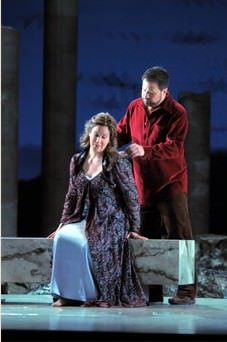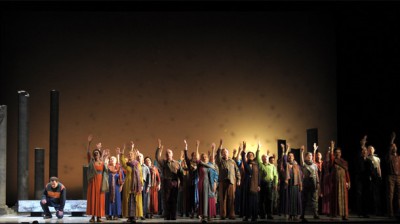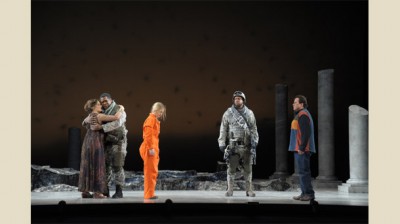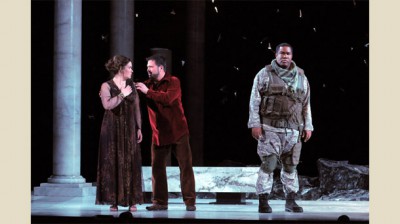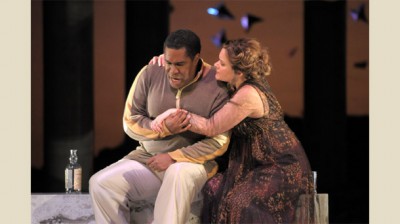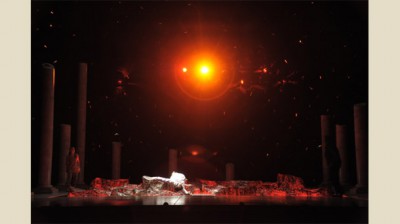Hercules
Composed by George Friedric Handel
Libretto by Thomas Broughton
Based on Sophocles’ The Women of Tracihs and Ovid’s Metamorphoses
Conducted by Harry Bicket
Stage Director Peter Sellars
Handel’s Hercules as strong as its hero
Peter Sellers’ Hercules is decidedly a dark affair. Set in contemporary times, the focus is pointed at the traumas of war. Hercules may still be the strongest of men, sacker of cities, but instead of the noble hero we expect to find, he is a deeply flawed man, riddled with anger and regret. His frustration with his wife, who is racked by jealousy of the young princess he brings home as part of his spoils of war, boils to the surface and their marriage suffers, neither party wishing to make up. When his wife is tricked into killing him, Hercules curses her with stunning vitriol; she is so miserable that she contemplates suicide – but, in Handel’s reworking of Sophocles’ play, is saved by the maid she so despised.
The production is wonderful. The mercurial soprano Lucy Crowe, who plays Iole, commands the role, and indeed the stage, in the stand-out performance of the piece. That said, no one slouches, with mezzo-soprano Alice Coote (Dejanira) and countertenor David Daniels (Lichas) doing particularly good work. Dejanira is one of the more complex characters, whose simple jealousy and misplaced trust in her would-be rapist (it wouldn’t be Greek tragedy if the women weren’t kind of dumb) prove to be her husband’s undoing. The vocal acrobatics every part must employ – this is Handel, after all – are never wasted or wasteful, and Richard Croft (Hyllus) is particularly impressive, in this respect. Eric Owens also gives a strong performance, and not without show, as the title character Hercules.
The chorus is strong as well, not only because of their vocal abilities, but because they are employed so well within the dramatic structure of the piece. Utilized not unlike a Greek chorus, they tell the audience what to think about the action on stage, as well as offer advice and encouragement, heeded or no, to the main cast.
The music is quintessential Handel: Baroque, ornamental, beautiful. He often riffs on a single textual line for minutes on end, like an Enlightenment-era MC5, which is aurally impressive, but does occasionally leave those on stage looking for ways to act around the repetition. Sellers often gives them actions representing certain lines, which are repeated with them. If one is looking for realism on stage (and, really, it’s opera, so who is?), one will not find it here. Instead, Sellers brings some of the spirit of experimentation and the avant garde that we see in some theater and European opera (I once saw a Fliegender Holländer with an aerobics spinning class, and an Iphigénie en Tauride that was set in Abu Ghraib, both while in Germany). And I, for one, applaud that: we don’t get all fussy when we see an Antarctic Tempest, or a Clouds in contemporary clothing; and how are classic operas any different? Why should they be put on a pedestal, out of the reach of experimental visionaries?
What is important, when setting a piece in an era different than its author’s intended, is that there is a reason one does this. A Soviet-style Macbeth highlights certain aspects of the piece, for instance. My point is, it can’t be an arbitrary decision; if there is change, it should be for a reason, not just, “Wouldn’t it be neat to set it in such-and-such a place / time?” And I think Sellers does this: he emphasizes the soldiers that come home every day who are broken physically or mentally by making Hercules just another man. He humanizes a demigod. Does this make the production uncomfortable sometimes? Yes. Particularly when Iole is marched onstage in an orange jumpsuit and a black bag over her head. It shocks the audience, and forces them to question whether this is tasteful, and subsequently why they feel it to be in- or out-of-bounds. Theater as provocateur. This was a strength of Hercules that, for instance, the Gluck opera lacked – they set the opera in Abu Ghraib, but there wasn’t any meaningful commentary beyond “America sucks.” Which is tragic, because the Deutsche Oper could have made something extraordinary, but instead fell into a tired trope. Sellers does not fail where the Berliners did.
This is a new production, so it would do to recount the technical aspects of the piece – which are on the whole exceptional. The set, Grecian ruins encapsulating craggy, barren rocks, is stark; the backdrops are exemplary, first casting different scenes (night, day, desert) and eventually becoming less representational and reflecting the inner turmoils of the characters on stage. The lighting was masterful. Costumes, I must admit, were something of a mixed bag: the chorus was well-costumed, with American-style desert camouflage and village clothes reminiscent of the contemporary Greek countryside. The costumes for the leads, however, were, on the whole, somewhat disappointing. Hyllus’ first costume was an uninspiring, olive / burnt orange / gray long-sleeved tee-shirt, and his second, though eye-catching at first, was a shiny vest-jacket; Iole’s costume after she left the orange jumpsuit was better, but not particularly special. On the whole, the costumes for the leads felt . . . old. They drew too much inspiration from the fashion sense of middle-aged Midwesterners instead of really interesting contemporary dress wear.
Still, in all, and especially when factoring in how impressive the set was (although the craggy interior of the ruins I felt was underused), the lack of shockingly good costumes was forgivable (although highlighted all the more). And with such exceptional talent on display, performing such an enjoyable piece, it is allowable, I think, for the lack of fashion to take a back seat to the music. This is a wonderful piece of art that those who like experimental work, opera, or Baroque music will consume rapaciously.
Highly Recommended.
Will Fink
Reviewed on: 3.7.11
For full show information, check out the Hercules page at Theatre In Chicago.
At the Lyric Opera, 20 N. Wacker Drive, Chicago, IL; call 312-332-2244, www.lyricopera.org; tickets $33-$194, through Mar. 21, 2011. Running time is 3 ½ hours.


